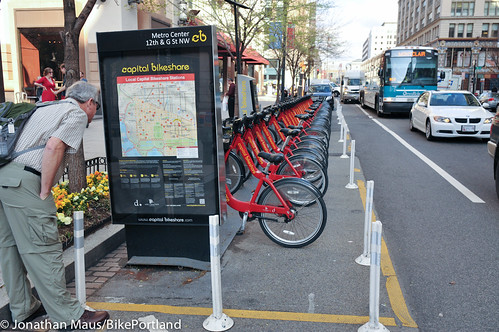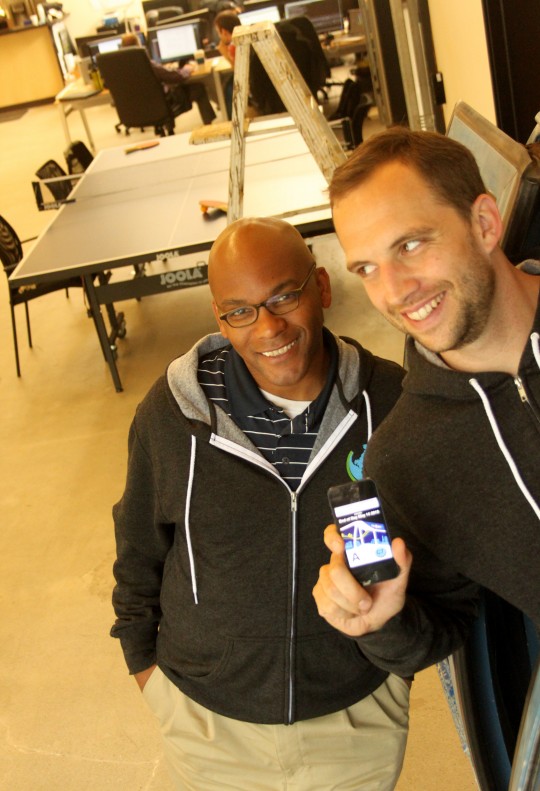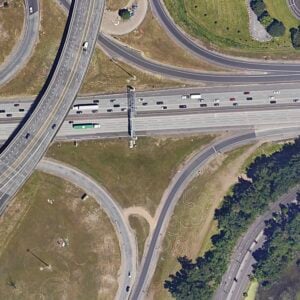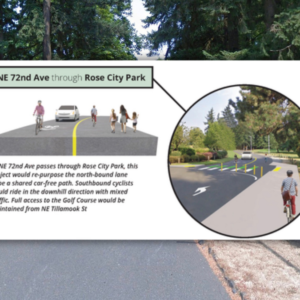
(Photo: M.Andersen)
The “single, supple mesh of mobility” that the government of Helsinki is hoping to use to “make car ownership pointless” by 2025 may be arising spontaneously and gradually in Portland.
For people reading between the lines, an announcement Tuesday from the North American Bike Share Association could lead to Portland becoming the first U.S. city where a single mobile app will be able to let you plan a trip and buy a ride from a bike share service, transit agency, carsharing company or ride-hailing service.
Even that would still be a far cry from the unified payment and fare system envisioned by Helsinki and by transportation dreamers around the world. That’s the digital key to the city that would be convenient enough to replace car ownership for a large share of the population.
“The holy grail that Tom Miller talked about … is interoperability.”
— Steve Hoyt-McBeth, Portland bike share
But it’s a significant step in that direction — and Portlanders are playing an outsize role in making it happen.
If it works, it’ll be part of a total rethink of urban mobility that’s been happening little by little for years. Instead of assuming that people choose a single mode (car, bike, transit) and use it exlusively, the public and private sectors would both be focusing on helping people choose the best mode for each individual trip they make.
In an interview earlier this month, Portland bike share project manager and NABSA board member Steve Hoyt-McBeth described “interoperability” between bike share and other modes as a “holy grail” that was being discussed by former transportation director Tom Miller back in 2011. It remains “part of the vision of things” as the local bike-sharing system prepares to hire its first general manager, Hoyt-McBeth said.
“In the short term I think we’re just trying to get a system on the ground,” he added.
Open data will make bike-share trip plans as easy as transit
Tuesday’s announcement from NABSA was so dry that it was easy to miss its importance.
“NORTH AMERICAN BIKESHARE SYSTEMS ADOPT OPEN DATA STANDARD” was the headline.
But it’s a very important step for North American bike sharing — as important as the open data standard co-created by TriMet and Google in 2005 has been to public transportation.
There’s currently no way for Google Maps to figure out that a five-minute bike-share ride could shave half an hour from a transit trip.
That’s because the transit data standard, called the General Transit Feed Specification, is what makes it possible to get transit arrival information in third-party apps like Google Maps, PDX Bus, Transit App or RideScout.
Today, if you want to get around on bike share in an unfamiliar city or neighborhood, you need to download a special app for that bike share system, find a station with available bikes, then switch to Google Maps to plan a bike-friendly route, then switch back to the special bike share app to find a station to drop the bike at.
As for actual point-to-point trip planning, good luck. There’s currently no way for Google Maps to figure out that a five-minute bike-share ride could shave half an hour from a transit trip.
Tuesday’s announcement of the new “General Bikeshare Feed Specification” promises to wipe that problem away over the next few years.
The announcement included both Social Bicycles, the company that will provide equipment and software to the Portland bike share system that’s launching next year, and Motivate, the company that will operate that system.
“Social Bicycles is excited to be an early adopter of the new specification,” SoBi CEO Ryan Rzepecki said in a written statement.
Advertisement
Portland-based mobile startup is driving payment integration
The other reason Tuesday’s announcement is exciting has to do with a seemingly unrelated announcement last month by GlobeSherpa, the five-year-old Portland-based company that created TriMet’s mobile tickets app.
GlobeSherpa (which also operates transit ticketing apps in Los Angeles and Phoenix and began service last week on San Francisco’s Muni) announced that the TriMet app would be the nation’s first to partner with a ride-hailing company: TriMet app users will get a button that lets them look up and (eventually) book a Lyft ride.
Here’s why that matters: GlobeSherpa was bought in June by a trip-planning app called RideScout, which was bought last September by Car2go North America. (Car2go, in turn, is owned by Stuttgart-based auto company Daimler.)
RideScout, meanwhile, has close relationships with bike share companies. Also last month, it unveiled a new system that will let people book and unlock a B-Cycle bike-share bike using their RideScout app.
“I live out in Hillsboro, I’m not near the bus stop, I can use the TriMet app to get a carshare, get to the bus station and use that same payment credential, that same application, to then ride the bus.”
— Mac Brown, GlobeSherpa spokesman
In an interview Wednesday, GlobeSherpa spokesman Mac Brown said all of this means that it’s a matter of “resources and time” before a GlobeSherpa app like TriMet’s will be able to let people book car2go, Lyft, and bike share rides using the TriMet app.
“I live out in Hillsboro, I’m not near the bus stop, I can use the TriMet app to get a carshare, get to the bus station and use that same payment credential, that same application, to then ride the bus,” Brown said. “Same with bikeshare, same with rideshare taxi.”
Initially, Brown said, this will happen by “deep linking” to another app. But the companies have the technical capacity and the management buy-in to eventually allow purchases without leaving the TriMet app.
“It gives each entity the ability to acquire new users,” Brown said.
And that’s the key to the whole picture: because GlobeSherpa has (so far) secured exclusive relationships with transit agencies to operate branded mobile apps, it can offer transportation companies like Lyft and SoBi access to the huge user base of public transit riders if they sign on to the integrated platform.
“Transit is the backbone of the city when it comes to transportation,” Brown said.
— Michael Andersen, (503) 333-7824 – michael@bikeportland.org
Correction 2:50 pm: An earlier version of this post included the wrong word in Brown’s final quote.









Thanks for reading.
BikePortland has served this community with independent community journalism since 2005. We rely on subscriptions from readers like you to survive. Your financial support is vital in keeping this valuable resource alive and well.
Please subscribe today to strengthen and expand our work.
Open data is awesome. We were stuck with Cale parking meters (who BRIBED public officials, which led to a FBI raid and a prison term) because their meters are so proprietary:
via
Also, GlobeSherpa is horrible. Their service barely meets the minimum standards of something that works. I feel sorry for nontechies that use it.
Have you used the new version they introduced a few months ago? It’s a little better.
When I was at the Austin conference where GlobeSherpa announced its Lyft partnership and RideScout demo’d its B-Cycle partnership, I used the mobile ticketing app there, which isn’t GlobeSherpa’s. Well, I tried to. I ended up almost missing my bus so I could get change at a bar instead.
All of this is going to get a lot better once we figure out how to make our phones act like keyfobs — swipe pattern on screen, hold next to bike-share bike for a moment, get on bike.
The parking meter scandal is a good reason why TriMet and other agencies should be preserving their technical ability to dump GlobeSherpa for a competitor if/when they need to someday.
I’m using whatever is on Android. I’m not sure if it’s been updated. The app itself is tolerable (though it defaults to the “buy tickets” screen even if I have tickets), but the combination of server-side ticket authorization and tickets being “locked” to a phone really makes things problematic.
I also dislike all these incompatible transit payment systems. Though incompatible ticket systems is sort of defacto. Even places that are supposedly regionwide (SF, LA) really aren’t. Ah well.
Having to decide ahead of time whether you’re buying day passes or single-ride tickets makes the GlobeSherpa app less useful than, say, cash.
I lose more money on tickets that I can’t recall to a new phone than I do on the single-vs-allday thing.
How often do you get a new phone….
on purpose? yearly. When I break it? A little more often.
I second the shout out to open data, and would add that open APIs are awesome as well. Why shouldn’t other developers be able to jump in and make their own payment apps?
I have to agree on how awful the GlobeSherpa app is. After the update, it automatically takes you to the buy tickets page, even if you already have valid tickets. The look and feel doesn’t match iOS and the menu is cumbersome. Plus, the app is very slow.
I’m not here to defend GlobeSherpa’s app design, but I’m interested in this subject so I’ll keep typing … I think the fact that it now opens to “buy tickets” rather than “my tickets” probably makes usability easier for first-time and occasional users, while making use more annoying for regular users. That seems like an OK tradeoff.
I agree the app could be better. But for me, it’s still a lot less annoying than buying tickets from a big metal machine, or remembering to buy books at a grocery store, or (worst of all) carrying change.
I agree, although the hamburger menu means two taps to get to my tickets instead of one. I’m counting down the days until Hop goes live. 😉
It’s better than keeping a bin of dollar coins like I used to. But yeah, the “buy vs use” tab thing is easily fixed by only going to the “buy” page if there aren’t any downloaded tickets.
The other thing I use the app for is checking the bus arrival time. That’s a painful process.
You’re right, that would be better.
I actually feel like it used to default to the purchased tickets screen. This nonsense of pushing me to the buy tickets screen is new – and super annoying.
It definitely used to go to the purchased tickets page. Not sure why that was changed, but it’s very annoying.
Why is it that all this info and associated stuff is coming out about how bike share compliments public transportation, and it’s not getting taken over, sponsored by, or partnering with the public transportation agencies?
I’ll say it again as I did 1000 times before – bike share (for Portland) needs Trimet and Trimet needs bike share. It’s so obvious and nearly perfect that the complete at utter silence (by both the bike share companies and the public transportation agencies) of this powerful combination is painful.
Obviously some people do get it, as this article points out. But until the agencies start cooperating and partnering up, it won’t be anywhere near as successful as it could be.
Put yourself in Trimet’s shoes. Why would you (Trimet) want to get involved with bikeshare?. Will it reduce operating costs for your buses/trains, increase ridership for them? Will it cost you money, that you have to find in your budget? Will it get you more funding sources? How can you be convinced this is something you (Trimet) actually want to do?
It’d increase MAX capacity by reducing bike carry-ons; increase ridership by extending the walkshed of frequent-service stations, and increase the appeal of transit commuting by making it easier to get around midday. And compared to mass transit it’s very cheap to operate per ride.
LTD in Eugene is a funding partner in its bike share system. IMO the only things holding back TriMet are a lack of vision and the fact that the city has been claiming bike share as its thing.
Some kind of app that puts it all together sure would be nice. In the Twin Cities we have all the pieces: a decent transit system, a decent bikeway network, bikeshare, car2go and two conventional carsharing systems (Zipcar and Hourcar). And I use them all (except Hourcar so far, but I may yet join them because their cars are closer to my house than Zipcar’s).
But to manage my Transport 2.0 life, it takes SIX different apps, none of which talk to each other or have remotely similar interfaces:
– the Metro Transit mobile website to figure out where and when the trains and buses run.
– the Bike Maps app to access the excellent city of Minneapolis bike map, to figure out the best bike route.
– Google Maps in bike mode, to figure out routing in the suburbs.
– the Nice Ride app to figure out where the freaking bikeshare stations are.
– the Car2go app to figure out where their nearest car is.
– and the Zipcar app to find and reserve their cars.
Needless to say, for me to take a trip outside my zone of experience (and sometimes within it) requires advance planning. An app that shows me the various options to get to a destination using *combinations* of biking, walking, transit and/or uncongested driving (it can easily cost over $1 to wait at a long light in a car2go!) would be awesome. Meanwhile I just try to keep as much of the transit and bikeway networks in my head as I can, and use the other apps to look up more specific details.
The article quotes Stephen Hoyt-Macbeth saying, “interoperability between bike share and other modes as a “holy grail”. We have an excellent opportunity coming soon – if Tri-met would agree to let bikeshare use the new Hop Fastpass card they’ve announced for rollout 2017. Even better would be if the PBOT would use the same card for parking machines.